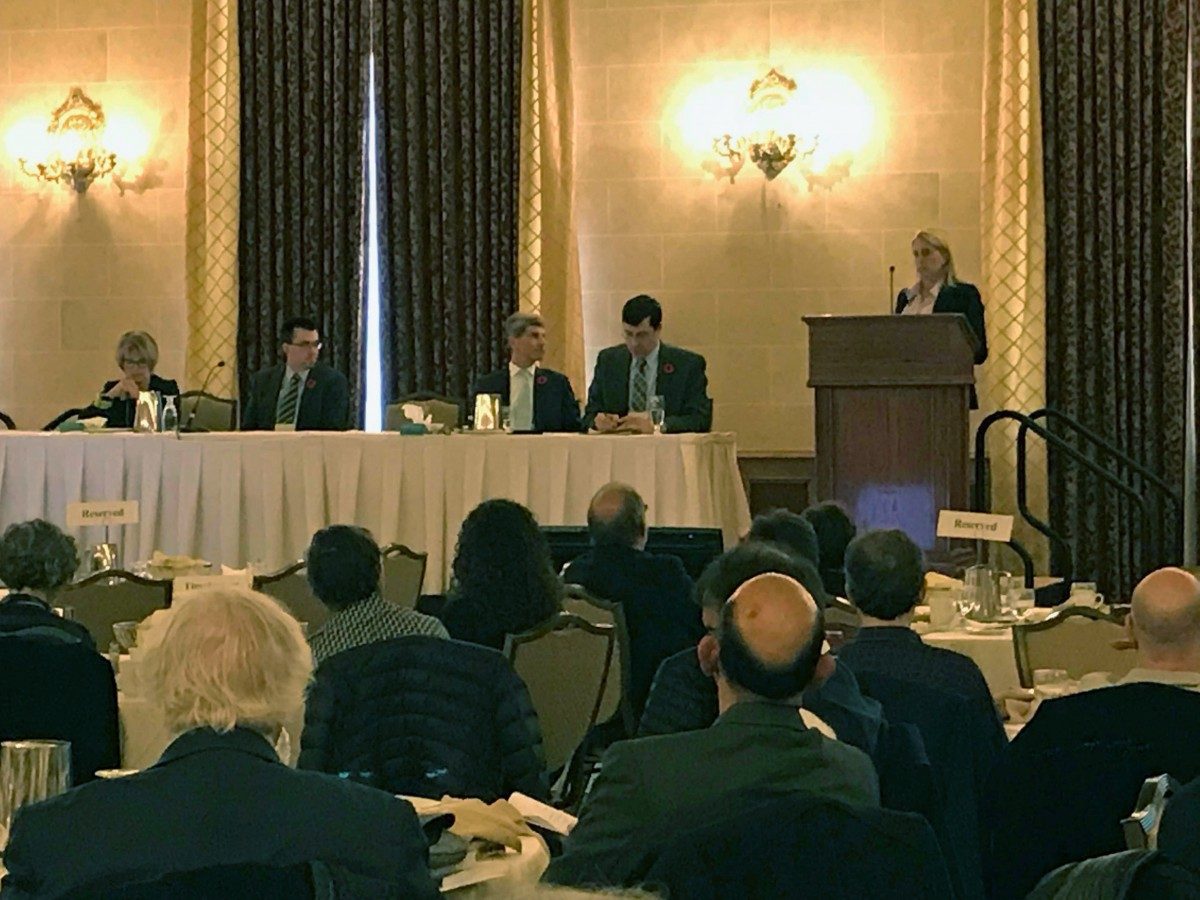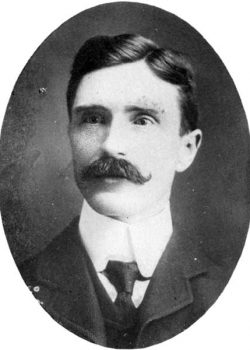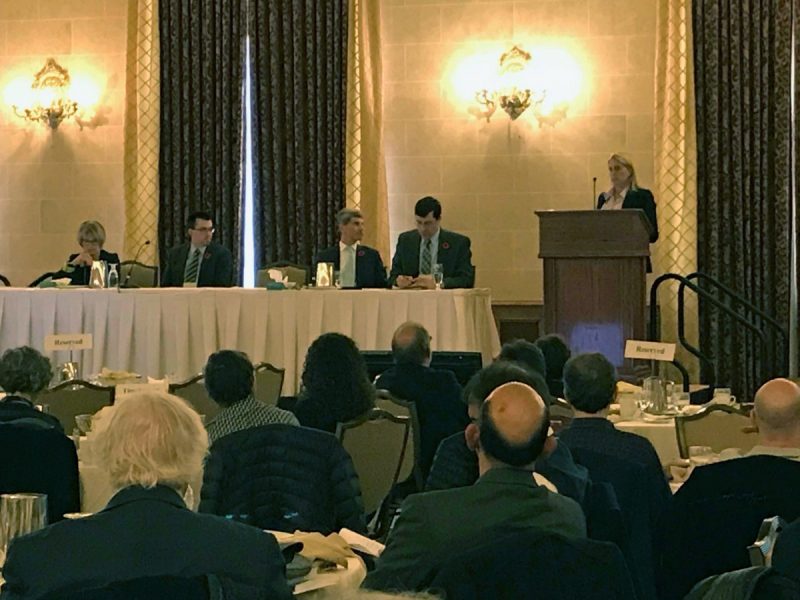
2017 Pitblado Lectures: #140Down – Now What?
The Future of Lawyering is Here
The Pitblado Lectures were established in 1960 by the Law Society of Manitoba, the Manitoba Law School and the Manitoba. Bar Association to honour Isaac Pitblado on the 70th anniversary of his call to the Bar. Pitblado had a reputation as a great legal mind and for most of his practicing life, was involved in issues of freight rates and grain marketing. Pitblado died in 1964, a Life Bencher of the Law Society.

Isaac Pitblado (1867 – 1964). Photo source: Memorable Manitobans (Manitoba Historical Society).
The University of Manitoba’s Faculty of Law continues to be involved in the annual Pitblado Lectures, with one or more Robson Hall faculty members sitting on the organizing committee. Together with their counterparts from the Law Society and MBA, they select the topic of the lectures, identify and contact guest speakers and panelists and chair panels, introduce and thank presenters.
For the 2017 lectures, which took place November 3rd in the Grand Ballroom at Fort Garry Place Conference Centre, the Robson Hall representatives were Associate Dean (J.D. Program) Lisa Fainstein and Associate Professor Gerald Heckman. Vivian Hilder, a former Faculty member, was the “organizer in chief” and played a key role in making the lectures happen, and the program chairs were the Honourable Justice Chris Martin, Manitoba Court of Queen’s Bench, and David Swayze, Partner, Meighen Haddad LLP.
Fainstein emphasized the importance of the Faculty of Law’s ongoing involvement in the annual event saying, “the Pitbaldo Lectures, with the mandate of looking at the big ideas in law, is an important link between the profession and our faculty and students.”
The theme of the 2017 lectures, which coincided with the 140th anniversary of the Law Society of Manitoba, was The Future of Lawyering. The topics and speakers were selected to demonstrate that lawyering is currently undergoing a period of significant change and to challenge the legal community, including faculties of law, the judicial system and law societies to recognize this change and to embrace the opportunities that come with it.
Mr. Jordan Furlong, a leading analyst and forecaster for the global legal market, was the keynote speaker. He was joined by a diverse group of innovators and experts from across North America including: Shannon Salter, Chair of the BC Civil Resolution Tribunal, Canada’s first online tribunal; Mr. Justice Leonard S. (Tony) Mandamin, of the Federal Court, Dr. Larry Richard, a leading expert on the psychology of lawyer behavior, Monica Goyal, an entrepreneur, lawyer, teacher and innovator and Darrel I. Pink, long time Executive Director of the Nova Scotia Barristers’ Society. Local practitioners Shauna McCarthy (Brown and Associates) and William Gange (Gange Collins Holloway) also spoke about change in their practices.
This year, the organizing committee made several significant changes to the format of the conference that reflected the theme of “change”. The lectures were held on a single day rather than two – leading to a packed agenda. Materials were distributed online rather than on paper in binders. Presenters were introduced by means of short, informative and humorous video presentations rather than through a recitation of bios. Lunch was accompanied by a “Ted Talk”-style presentation on “the key to making an excellent lawyer.” Finally, the presentation of the Richard Scott award, awarded annually to a person who promotes the rule of law through advocacy, writing or education, was integrated into the program at the end of the day.
Throughout the day, speakers described changes in legal education, client expectations, technology, lawyer self-regulation and the provision of accessible legal services which are occurring at a brisk pace. To thrive in the future, practitioners were challenged to become more client-focused and service-oriented. Lawyers were challenged to improve the existing system of self-regulation or risk losing regulation of the legal profession to governments. The justice system was challenged to offer accessible dispute resolution services tailored to the needs and expectations of individuals with legal problems whose primary aim may not be to get “their day in court” but to solve their problems with minimal delay and expense. Law faculties were invited to integrate into their curriculum opportunities for their students to become aware of the changing profession they will soon be joining, including the evolving role of technology in legal practice. Lawyers were also challenged to address research in the fields of psychology and neuroscience that indicates that their own personalities make them resistant to change and to employ strategies to help them overcome these barriers and thrive in their practice of law.

“Big Ideas Panel”: The Honourable Madame Justice Colleen Suche, Paul Grower, Dean Jonathan Black-Branch, Dr. Gerald Heckman (moderator), Kathy Bueti. Photo by Law Society staff.
Robson Hall’s Dean of Law, Jonathan Black-Branch was involved in the lunch hour “Big Ideas Panel,” which was very well received by the audience. Each of the four participants was asked to advocate their assigned perspective on what is the key to creating excellent lawyers. Dean Black-Branch argued that Education is key. Kathy Bueti, Bencher vice-president and criminal law litigator at Bueti Wasyliw & Wiebe claimed that the certification process was all-important. Paul Grower, tax litigator and partner at Fillmore Riley argued that experience was key. The Honorable Justice Colleen Suche of the Manitoba Court of Queen’s Bench claimed that mentorship was the crucial element. While all speakers garnered applause, Paul Grower’s presentation won the most applause. He argued that every lawyer can point to an excellent lawyer – a “master” in lawyering who has become great not so much because of what they learned in law school or whether they were good at writing exams, but through a lifetime of experience. The panel’s overarching message was that legal education, the certification process, experience and mentorship are all integral to creating excellent lawyers.
The Pitblado Lectures occur around the same November date every year and are Manitoba’s premiere Continuing Legal Education event. The lectures bear on “big picture” topics that are of interest to a broad segment of the legal profession and give practitioners an opportunity to look at and focus on important legal issues through a different lens than they would in practice or in other CLE programs.






